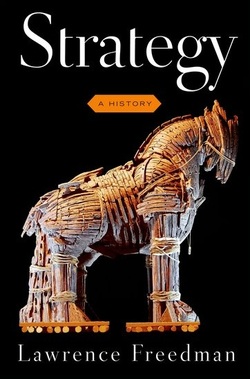|
Every now and again, an article lifts itself above the many that I read each day to capture my attention. This one is one of those. It is short, easy to read and, crucially, on the money.
0 Comments
The task of exposing the twelfth and last page of my desk calendar, in a couple of days' time, signals the arrival of the Christmas season in our household. As happens each year, my mind moves to the prospect of spending time with family and friends; to BBQs; to warm weather (as happens when one lives in the Southern Hemisphere); and, to the books that I'd like to read over the holiday period. This year, there are just three titles on my list. Hopefully one or more of them finds their way under the Christmas tree later in the month!  The Victorian City, by Judith Flanders. Flanders has written several books about Victorian London, none of which I've read. This particular title caught my eye when I was browsing in a local book store, perhaps as a result of my heightened awareness of the great city following my recent visit there.  The Men who United the States, by Simon Winchester. Winchester ranks amongst my favourite story-telling authors. I've enjoyed The Surgeon of Crowthorne, A Crack in the Edge of the World, and The River at the Centre of the World in the past. If this new title is comparable, then I suspect that I'm in for a treat.  Strategy: A History, by Lawrence Freedman. This newly published title has received critical acclaim from several well-regarded reviewers. It offers an expansive view of strategy and strategic thinking, from ancient military strategists (Achilles, Sun Tzu, Machiavelli) to modern business strategists (Drucker, Sloan). At 768 pages, I may take a while to get through this one! A somewhat satirical opinion piece, written by Joe Bennett, caught my eye this morning. As I read it, over my morning coffee, I smiled, for the opinion piece is very well written. But afterwards, as I sipped on my coffee again, I winced, for the images conjured in Bennett's mind and exposed through prose, cut a little closer to the bone than many who are au fait with boards and governance would care to admit.
Most of the directors that I know, and boards that I am familiar with, work hard, as they seek to optimise business performance and build shareholder value. They read their board papers carefully and critically before meetings, prepare well and ask searching questions. They also spend time understanding the business of the business, so they can contribute meaningfully to strategic discussions, and make informed decisions about the strategic future of the business. In other words, they engage actively in the process of governance. However, some (perhaps the majority?) directors and boards still don't engage in this way. They adopt a more passive modus operandi of monitoring past performance. They spend little, if any, time considering strategic options and marking out the future of the business. In extreme cases, they behave as Bennett suggests. Sadly, the self-serving, fat cat imagery described by Bennett will remain part of the psyche—for as long as it continues to describe how some boards behave at least. I long for the day that such imagery becomes folklore, of the way things used to be, but no longer are. Universities provide ideal conditions within which eccentric personalities—learned but oft socially-challenged individuals with a tenuous connection with the real world—tend to congregate. The article Academic Tumbleweeds summarises the situation eloquently.
Over the years, I too have criticised those academics for whom the pursuit of knowledge is the end, because social ineptness, eccentricity and misguided thinking often follow. This is not to criticise universities per se, for they have a crucial role to play in society. By way of example, it is unhelpful, even perhaps unethical, for business school academics to pursue a neo-Marxist anti-business agenda—but that is how some, whose primary interest is the pursuit of knowledge, behave. It's almost a sport it seems. One of my concerns in embarking on my journey was to avoid becoming caught by the stereotype—thus my decision to work from home and to intersperse other activities, in order to maintain contact with reality. These other activities have included a few teaching, facilitation and short advisory assignments, and a couple of board appointments. Is it a reasonable approach? No doubt the proof will come when the usefulness of my research is tested in the real world. Hopefully, it won't be found wanting and the somewhat derogatory academic tumbleweed label will not be required. One of the most common requests I get in my advisory and research work, and at speaking engagements, is to provide a definition of 'governance'. I think it keeps coming up because there's no universally accepted definition. To press the point, when Africa Zanella asked for a definition of governance on LinkedIn recently, her question generated over 50 replies.
Notwithstanding this, we need to try understand what governance is and what it is not. Here's my take (which also appears as one of the 50 replies): I have come to understand that governance is an activity. It has a purpose (what) and a process (how).
To be effective in governance, boards need to understand their purpose, and have a process through which to determine performance goals (develop a strategic plan, together with management) and oversee performance against plan (a monitoring regime). In contrast, the primary role of management is to implement the approved plan (having contributed to its development, with the board). Hopefully, this view is helpful. Love to hear what you think! The recent spate of train, bus and plane crashes in Western Europe, Canada and the US has, understandably, precipitated a series of articles by reporters, journalists and others. Some have reported the facts, while others have sensationalised the events, provided a human view, or speculated the causes of these disasters.
Amongst the articles I have seen, one stood out because it raised some interesting bigger questions—of jumping to conclusions in some deterministic sense; of shoddy reporting; and, dare I say it, of cultural prejudices. I commend the article to you—perhaps to stimulate your mind as you take time out to enjoy a coffee—because it highlights the power of the written word to influence the way we perceive reality. I've been reading some back issues of The American Scholar recently, as part of my personal commitment to read widely and explore topics that I'd not normally think about. Reading widely is the side story of my quest to explain how Boards influence company performance. It provides a bit of balance to the humdrum of reading academic papers.
Some of the articles and books that I have read have really captured my attention and thought. One such article, originally published in the Spring 2010 issue of Scholar, summarised British philosopher A.C. Grayling's book Ideas that matter: The concepts that shape the 21st century. Grayling introduced 12 ideas that would, in his opinion, dominate public consciousness and debate during the century ahead. This sounded remarkable, for the making of reliable predictions—especially longer-term predictions—is notoriously difficult. A reliance on empirical evidence can easily lead to erroneous conclusions—the White Swans Thesis is a famous case in point. Notwithstanding this, most, if not all, of Grayling's predictions are coming to pass, just three years after his thesis was published. What does this say about Grayling's ability to predict the future? Did he see something that most of us missed, or is Grayling's "long term view" actually much shorter than what readers might have assumed in reading the title? I suspect the answer lies somewhere in the middle. Call me a sceptic if you will, but I'm yet to see a robust case to suggest that the making of future predictions based on empirical historical evidence is anything more than intelligent guesswork. Periodically, the topic of success appears in my musings. As recently as yesterday for example, I wrote about core purpose and values—in tandem—as being crucial to achieving high performance and, by implication, success. But what is success? How do you define it?
For eons, most Western cultures have defined success extrinsically—by what others have, what others think about us, or what we think others might think. Money and power are the benchmarks of success in any society founded on accumulation. You know the story: the more people have the more they want—all in the name of so-called success—and so the bandwagon rolls on. I have long thought that extrinsic ambition is hollow and fraught with danger, because the price one has to pay to be successful in monetary or power terms only spirals one way—upward and, inevitably, out of control. Thankfully, calls to redefine success are starting to emerge. I hope such calls are heeded, lest our society simply collapses around us. And we wouldn't want that, would we? The core purpose of most organisations is to maximise its performance—whether it be a not-for-profit agency, a government department, a faith-based group, a health provider, a commercial enterprise, or any other organisation. The definition of performance differs from organisation to organisation differs, of course. NFPs measure performance in terms of services provided, whereas commercial enterprises generally measure performance in terms of wealth creation, for example.
Notwithstanding this honourable goal of maximising performance, many organisations struggle to perform as they'd like. Often, regulatory frameworks and internal confusion (over purpose, strategy and operational priorities) divert attention and resources away from the "business" of the organisation. Why is this? I'd like to suggest that many organisations are not entirely clear about why they exist—even though they think they are. When I'm asked to help an organisation with its performance, one of the first things I ask about is core purpose. Sometimes a clear statement is provided, but only sometimes. More tellingly though, the underlying values and belief system—upon which behaviour is based—is generally not nailed down. Organisations are complex, socially dynamic entities, and even the best laid plans can be readily undermined by dissenting (and sometimes well meaning) individuals or groups. And therein lies a root cause. High performance is generally contingent on having a clear purpose and an agreed set of values to guide behaviour and decision-making. Just ask the CEO of any successful enterprise. My work—if you could call it that, because I don't get paid—entails much reading. Every day of every week, I delve into books, magazines, journal articles and new feeds—all in the name of reading widely and becoming informed. Doctoral research requires it and, as I've come to discover, the quality of my thinking has probably improved as a result.
Today, my readings included an interesting short piece entitled Darwin's Finches. While I'm no evolutionist, this article did set me thinking about the validity of natural selection and adaptation to one's environment. Peter and Rosemary Grant's work was fairly compelling. It showed that natural events can precipitate small but significant changes within a population. That set off another train of thought—where does natural selection stop? Does it continue through to evolution (apes to humans, as has been speculated by evolutionists), or is natural selection real and evolution simply a theoretical position promoted by those whose worldview excludes the supernatural? Now I'm nudging against a big philosophical question. Better that I get back to my core reading I suspect! |
SearchMusingsThoughts on corporate governance, strategy and boardcraft; our place in the world; and other topics that catch my attention. Categories
All
Archives
February 2024
|
|
Dr. Peter Crow, CMInstD
|
© Copyright 2001-2024 | Terms of use & privacy
|

